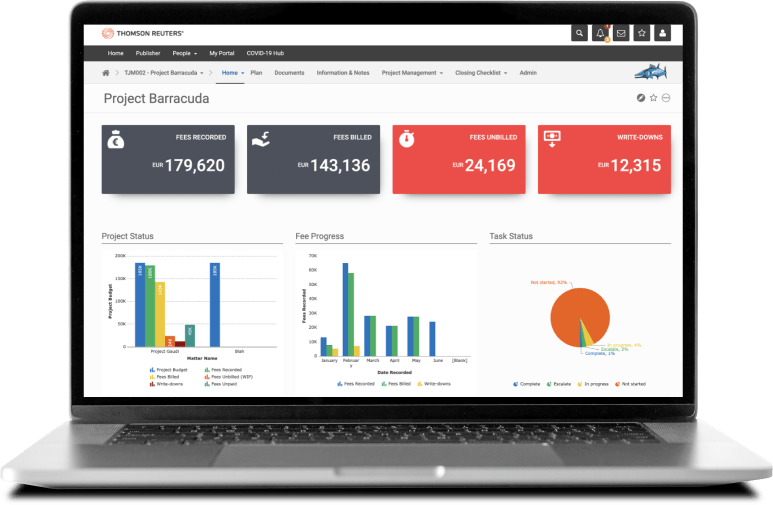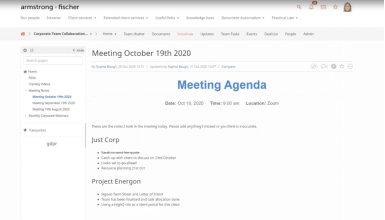An overview of the core case management, research, and collaboration tools every criminal defense attorney needs
As a criminal defense attorney, you can quickly feel overwhelmed when you get a new case. Where do you begin? Questions and decisions pertinent to the case appear to be endless.
What’s the best way to conduct research?
Where should I go for the most reliable sources?
How do you best map and track your progress?
Why is my client asking me this and how do I keep in regular touch?
In this blog post, we’ll tackle these questions by major use cases in a legal workflow.
Jump to ↓
| The case for criminal law software |
| Case management |
| Legal research |
| Communication and collaboration |
| Artificial intelligence |
Making the case for criminal law software
Even a tech-savvy attorney may find it challenging to keep tabs on every aspect of a case. Research alone can seem daunting. Having to consult a wide-ranging set of legal research sources may cause attorneys to get bogged down by updates to criminal law in general, and specific matters related to the federal criminal code such as interpretations as to what constitutes a crime of violence.
If this frustration leads them to only conduct surface-level, inadequate research, they may miss something particularly relevant to their case.
This is why having access to comprehensive and accurate content, intuitive research, and case management tools that enable efficiency and collaboration is critical for developing and managing your case strategy.
These types of tools are vital to ensuring your firm operates efficiently, and you can develop the strongest case strategy to increase the odds of a favorable outcome for your client.
Tech advancements in such tools have come a long way in recent years with the application of artificial intelligence. We’re now in a moment where AI is set to make transformational changes to the speed at which you can find accurate answers, and complete exceptional work for clients.
Let’s explore the top tech tools you need to run an efficient and successful criminal defense practice that delivers on top-notch client service.
Case management
Before anything else, the core logistics of a criminal defense case must be handled competently and efficiently.
This includes planning how the case will proceed, scheduling such critical tasks as client briefings and taking witness depositions, and billing clients in a regular and professional manner. A criminal attorney can employ a suite of case management tools to achieve these tasks.
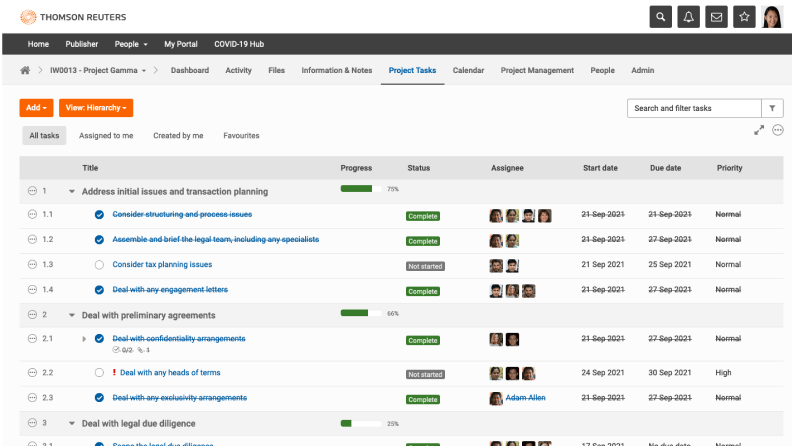
Criminal law firms using HighQ can improve collaboration, increase productivity and streamline projects.
Document management and analysis
Document management software, for example, is a solid foundation to start with. It enables attorneys to keep track of where the details of a case stand at any given moment.
- Are there outstanding documents that the client needs to review and sign?
- Is there a deadline for court filings?
- Does the attorney plan to file a motion to block prosecutor evidence?
By having a configurable site dashboard as a hub, attorneys and clients can monitor the status of various case aspects. It saves time, ensures consistency and reliability while also reducing risk associated with human error.
Task assignment and tracking
There are also substantial benefits to using automated time and expense tracking programs, which lets an attorney track case hours via various means (for example, syncing a mobile phone to a time-tracking system to note out-of-office work, such as talking to or texting clients).
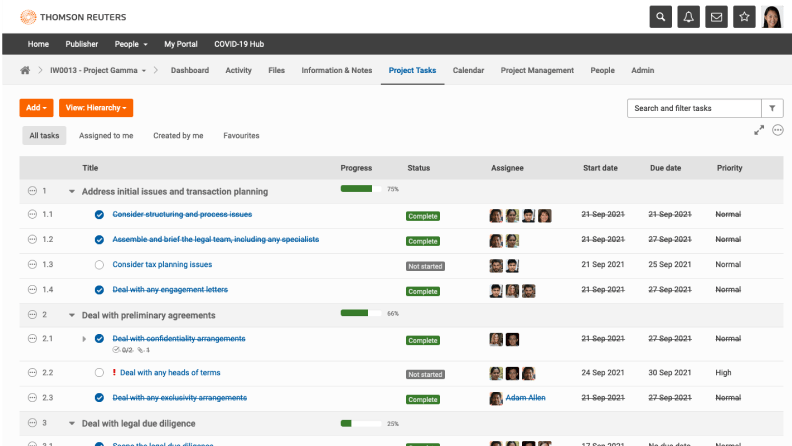
This simplifies the timekeeping process while also providing granular detail to clients as to how their attorney worked in each time period.
Billing
And billing software makes that aspect of your client relationship run more smoothly. Customize invoices and quickly review them for accuracy, set up flexible fee arrangements, and integrate client payments into their firm’s accounts payable system.
Legal research: Quality work, in less time
When it comes to legal research, you may worry that the more information at your disposal, the greater the likelihood of having to spend too spend too much time analyzing the information. This becomes particularly acute with a hard deadline like a trial date.
That said, because of significant advancements in legal research technology, you don’t have to make a tradeoff between depth of research and speed of analysis.
What defines a quality legal research tool?
Among the questions that an attorney should ask before committing to legal research software include:
“What are the core legal research capabilities that you should have as a criminal defense attorney?”
Document analysis, litigation analytics, authority verification and other features are a must:
Document analysis
An intelligent document analysis tool allows you to simply upload a document, yours or your opponent’s, and provides additional highly relevant authority that you, or your opponent, may have missed.
Litigation analytics
Litigation analytics tools provides insights into tendencies and timelines of your opponents, judges, courts and case types so you can manage client expectations and build the strongest case strategy.
Citator
A citator feature will tell you if the law you are researching is still valid or if it has been overturned by a court.
This tool will list criminal cases that cited your source, along with any negative history, such as an overruling. For instance, some citators, like Westlaw’s KeyCite, will flag or put an icon at the top of a given document if there’s an issue.
Access to how-to guides, templates, checklists, comparison charts and more
Find the answers you need when navigating a criminal defense case. Focused topics like White Collar Crime and Investigations offer a variety of on-point resources, all written and maintained by experienced attorneys to help you quickly get up to speed and practice efficiently.
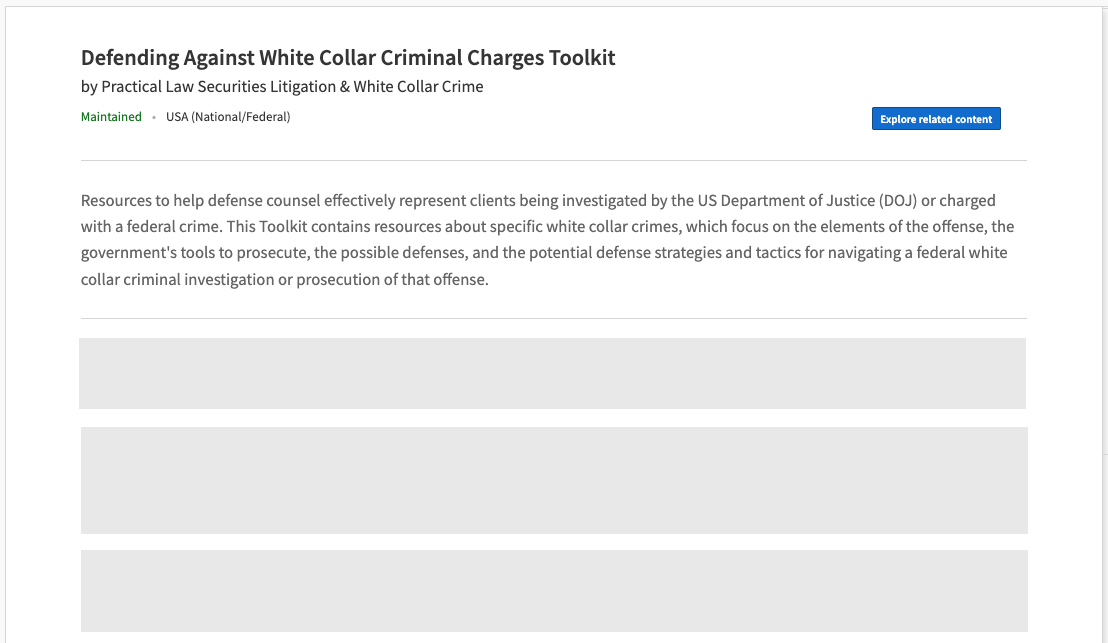
Specialist Litigation Resources on Practical Law
Resources to defend against white collar criminal charges
Request free trial ↗Other crucial questions might be:
“What do actual customers have to say about legal research and practical know-how tools?”
and,
“What do customers say overall about top research software on the market?”
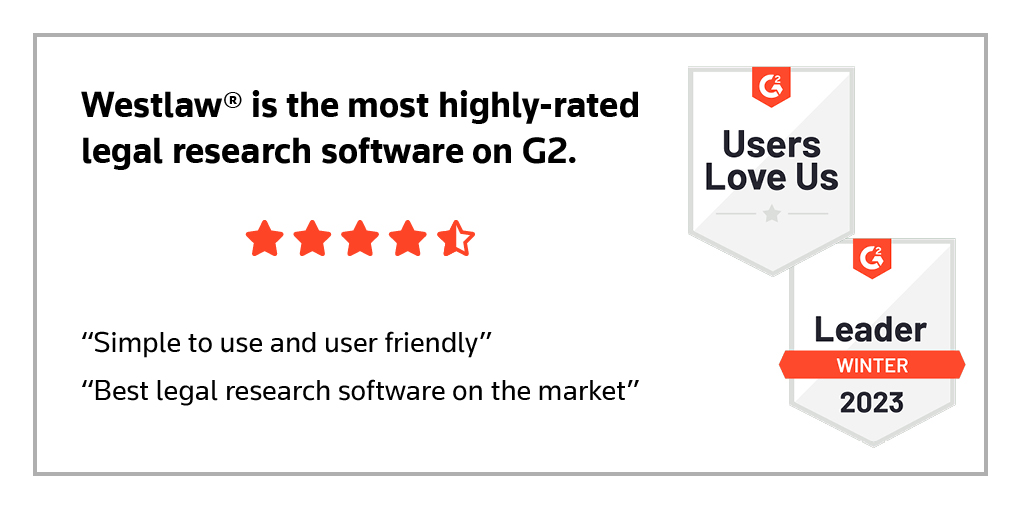
View Westlaw® reviews on G2.
Next-level communication and collaboration
What also makes a criminal defense case run smoothly is an integrated solution to work with colleagues, collaborate on projects, and engage with clients.
In the past, touching base with a client or a co-counsel might have entailed a lengthy round of emails or missed voicemails, with legal assistants trying to coordinate between three or more parties.
 |
Further, it’s now much simpler for all parties in a case to virtually collaborate. An attorney writes a brief; the client reviews it and adds their input; a co-counsel reviews and edits the client’s revisions. Where this once could have meant a long chain of paperwork, it can now be a single Google Document.
Keeping regular communication can be simplified. Clients and attorneys can check in with each other multiple times a day via secure messaging or brief video conferencing. If an attorney has a question, a client can answer it on their own time, without any need to schedule a meeting.
Artificial intelligence
The innovations that technology is bringing to criminal cases are still only in the early innings. There is a vast potential for artificial intelligence to fundamentally transform how legal cases will be conducted in the future.
Machine learning, a type of AI, is already being used to hone and deepen legal research. AI enables attorneys to automate their most repetitive and time-consuming tasks, such as drafting standard agreements and contracts.
AI-driven predictive coding lets attorneys search for critical clauses in a particular document in faster and more intuitive ways. Attorneys can review the system’s findings and refine their searches further, with the AI looking for relevant language, such as case citations or precedents.
Through AI, a criminal defense attorney can improve their case on all fronts. They gain more incisive research, faster document analysis and processing, and a more precise means to track their case’s progress.

